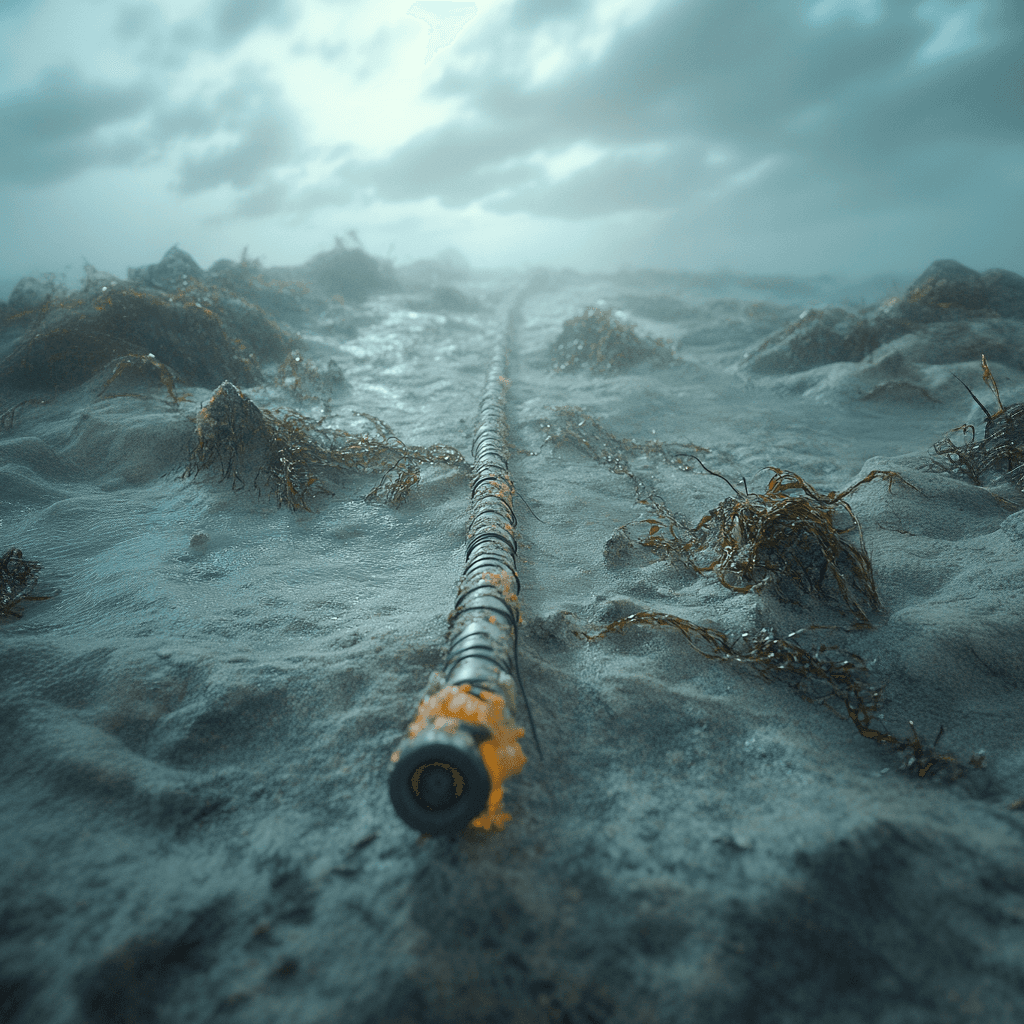If the Internet, our lifeline, suddenly breaks down
In the column series “What the world would be like, if...” Elcke Vels explores intriguing scenarios that deviate from the status quo. Each column is supported by AI-generated images.
Published on November 2, 2024

Our DATA+ expert and Editor-in-Chief, Elcke Vels, explores AI, cyber security, and Dutch innovation. Her "What if..." column imagines bold scenarios beyond the norm.
From the moment we get up until we go to bed, our eyes are focused on the screen. An average Dutch person spends over five hours online every day. And when we think of the business world, the Web seems completely indispensable. Offices run on Zoom calls, project management tools, and cloud solutions. Orders, logistics, and communication: everything leans on a smoothly running network. How scary would it be, if our beloved Internet, our lifeline, broke down?
It's unlikely, but we can't completely rule it out either: severing deep-sea cables that carry massive amounts of Internet traffic between continents would cause profound disruptions. Although these cables are not easy targets for attacks, they do sometimes get accidentally damaged. In 2008, people in the Middle East, India and Southeast Asia experienced major Internet disruptions due to damage to undersea cables. This happened no less than three times in a short period of time, when cables were cut or otherwise disrupted.
It's scary imagining that our “digital heart” stops beating. Yet today we take the plunge. What would the Netherlands look like if the Internet suddenly disappeared for months at a time? And what would this mean for innovation in our country?
Reading books

You wake up, stretch, and automatically reach for your phone. To your surprise, you see nothing: no notifications, no messages. You laugh about it - maybe the wifi isn't working well today. Once you're dressed for breakfast, I'm sure you'll be able to get back online. But an error message appears as you sit down at the table and try to open your news app. Your social media and emails also remain blank. Strange, but you don't have time to think about it; you have a train to catch.
At the station, the situation soon becomes unsettling. The screens above the platforms are black, and no one knows when the next train is coming. The entrance gates to the platforms are also jammed and unresponsive, with no digital connection. Employees try to explain what they can, but the information falters.
Frustrated, you decide to go home again, but even there the problems keep piling up. Your laptop can't connect to the company network, and a colleague texts that the entire system is down. Even the television is silent. That's going to be book reading today.
Renewable energy
A few weeks without the Internet would plunge the Netherlands into an innovative crisis. The consequences would be enormous. First, let's talk about renewable energy. Wind turbines and solar farms are increasingly monitored remotely. Sensors transmit real-time data on performance, failures and maintenance needs. Without the Internet, these systems fail, meaning problems are not detected and repaired in time. Among other things, this causes all wind turbines to shut down.
Solar and wind farms also base their energy planning on detailed weather forecasts delivered via the Internet. Without access to that data, it is difficult to accurately forecast production, which makes it more difficult to anticipate expected output. Coal-fired power plants may have to temporarily fire harder.
Agriculture
Then the agricultural sector, where technologies such as precision farming and data-driven decision-making are indispensable. Farmers using smart sensors and drones for their crops can no longer benefit from real-time data. Data that are just so essential for optimizing production.
Take, for example, tulip cultivation, an important export product for the Netherlands. Tulip farmers rely on sensors that collect information about soil moisture, temperature and light intensity, allowing them to fine-tune their irrigation and fertilization strategies. Without access to this data, they face reduced flowering quality and lower yields of their tulips.
Education
As if that weren't enough already. The world of education is also being hit hard. Many institutions have integrated online learning resources, distance learning platforms and digital communication tools into their curricula. Students and teachers would have to fall back on traditional teaching methods, leading to a slowdown in learning and the development of skills essential for the future. And indeed: no more ChatGPT to come to the rescue for reports and papers. The library is suddenly full of stressed-out students who spend nights at their desks.
The healthcare industry has become increasingly dependent on digital technologies in recent years. Consider, for example, , where patients can be advised or treated remotely by doctors via video call. In a situation where the Internet suddenly goes down, this innovative approach would come to a complete halt. Or: imagine that a doctor needs to perform emergency surgery, but cannot access the necessary information about the patient. This could literally put lives at risk.
Pen and paper
To put it mildly: things are not going well in the Netherlands should the Internet break down. Fortunately, this scenario remains a fantasy for the time being.
Still, we cannot guarantee that everything will always run smoothly. So anyway, let's prepare for a what-if scenario. I suspect improvement is still possible. After all, the Netherlands was recently “shut down”. Several government agencies suffered from a malfunction in a Defense Department network. This led to problems at emergency services, the Coast Guard, the Royal Netherlands Military Constabulary, DigiD, the GGD, and Eindhoven Airport, among others. So, should the Internet go offline, emergency plans and training are indispensable, as are robust backup systems and local networks.
Should it ever come to that, as a journalist, I may even have to revert to pen and paper. Time to refresh my handwriting!
